In this day and age it is nigh-impossible to find a season of anime without an Isekai. From Konosuba and Slime Isekai to Sword Art Online and Re:Zero, they have invaded the medium. But the genre existed long before these more modern takes. .Hack//Sign did videogames almost a decade before SAO released its first light novel. Meanwhile Inuyasha did the same for fantasy worlds. Predating all of these though we have what can only be called an Epic in scale. Produced by Studio Pierrot during their golden years and directed by Tsuneo Kobayashi, I give you Twelve Kingdoms. Spanning 45 episodes, Twelve Kingdoms adapts the first 3 of 9 novels written by Fuyumi Ono. Novels which are still releasing to this day and that I would relate to Robert Jordan’s Wheel of Time in scale and influence.
If that doesn’t excite you, doesn’t make you want to hear more about this incredible series, then be gone I say! But if your interest is piqued and you want to hear about this fantastical world and Nakajima Youko’s role in it? Then read on, and lets dive right into it!
(Disclaimer: I am working to make 50 the new “average”. 70 is not an average score people. 70 is above average. Carry on.)
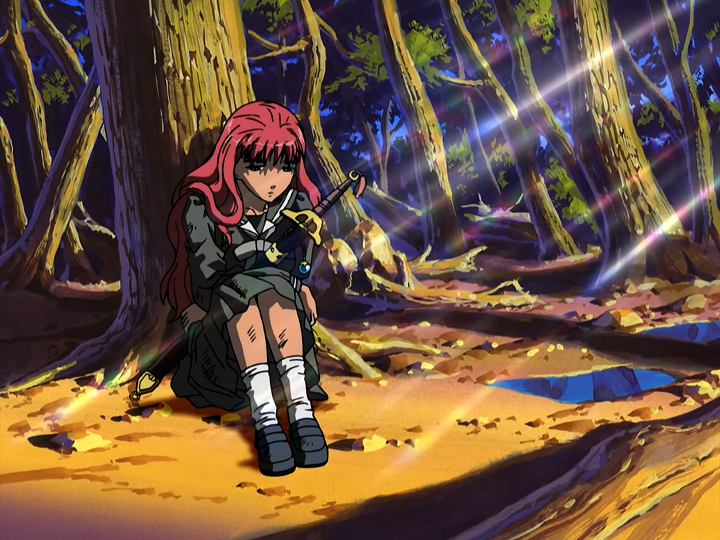
Animation/Art
Starting off, Twelve Kingdoms is not what I would call “well animated”. Sure, you will occasionally get a nice and crisp cut during the occasional battle scene. But by and large Twelve Kingdoms relies heavily on static shots for its presentation, the battles basically being a coin-flip on quality. Luckily though, Twelve Kingdoms isn’t the sort of show that needs heavy animation, it isn’t a kinetic series. This isn’t a battle Shonen or an action drama, the battles themselves are often the least important events in the story. Rather, Twelve Kingdoms is much more picturesque in it’s presentation. It focuses more on striking and memorable scenes that stick in your mind. Think of it like going for wallpaper photos instead of gif-able sequences. It’s not something you often find in modern anime production, at least not as successfully as you will here.
This leads me to the general art direction, the bedrock of Twelve Kingdoms‘ presentation. By and large I found both the color design and general art style to work quite well. Its colorful, but not in the modern moe sense. It’s not all pinks and reds and bright blues. Rather it’s the harsh orange of dawn, the soft blue of moonlight or a green tint after a storm. And when it really wants to make a scene pop, Twelve Kingdoms will crank up the saturation. This makes the scenes stand out from our own world and really sells the fantasy aspect. This is in no small part helped by the background art of Hiroki Matsumoto, who you can often find working as Art Director on some of your favorite series today.
What sells it for me though is the composite. The art of merging two images and making them feel like they inhabit the same world, like they belong with each other. This can include depth and lighting, but also things like relative speed between foreground and background or layering. If you are interested in a more detailed explanation there is a fantastic article on it over at washiblog. Back to the review, Twelve Kingdoms does a pretty good job at this. The lighting matches beautifully, sizes fit and the characters feel like they actually inhabit this world. It cheats sometimes of course, having them fly in the air or only showing their upper body. But the end result is really all that matters, and it was very rare for Twelve Kingdoms to take me out of story with its composite. The art style did that more than anything else.
You see rarely, very rarely, Twelve Kingdoms goes through an art style change. It’s only ever for an episode, or even a few scenes, at a time. But when it does it’s very noticeable. Designs shift, they become softer, face proportions become… off. I can’t say for sure but it feels like these episodes were outsourced, or deemed less important. That or they had a B-Team to handle the occasionally episode. This isn’t a huge misstep, it only ever happens between the big plot points and never really impacted my enjoyment of the show. But it did happen, and it was noticeable. All in all though I think Twelve Kingdoms can often be visually striking, but rarely particularly well animated.
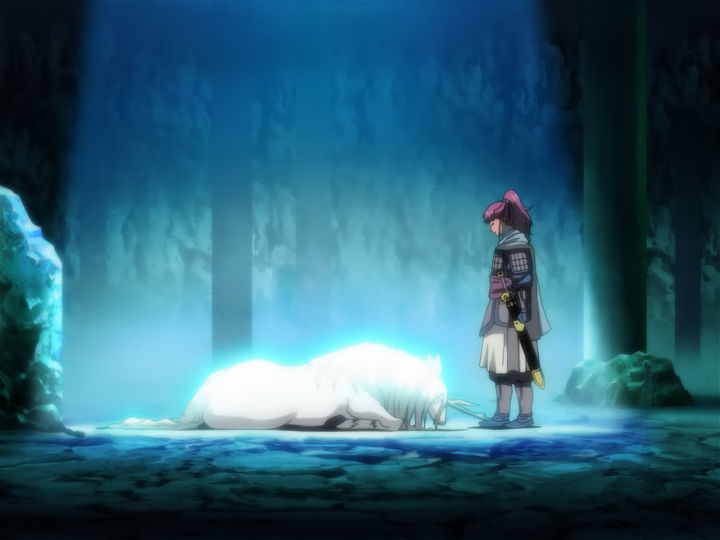
Direction
This brings me to the series direction, which is where Twelve Kingdoms true visual strength lies. Previously, I described this series as “picturesque” rather than “kinetic”. Relying on well framed and blocked shots rather than moment to moment movement. Examples of this include episode 11, where Enki is framed closer to the camera, making him appear larger despite being a much smaller character, on such a small boat. Or the image directly above using the moonlight to spotlight Nakajima and Keiki, Keiki himself stuck between a rock and Nakajima, framing him in the center. You can see examples of Kobayashi’s framing all throughout this post and its some good stuff. In particular I enjoy when Kobayashi is allowed to get surrealist, such as during some of Nakajima’s dreams or visions. These are truly some of the most striking sequences in the series.
I would love to be able to say more, but I am no expert on cinematography. So in place of expertise and knowledge, I will use examples. Screenshots from the shows runtime and a few words about why I enjoy them. Take for instance this shot of Kourin’s ring, blood pooled around it. The dangers all around from which she tries to protect King Kou, as it begins to seep inside. Or this wide, both establishing the location and just how impossible Suzu’s task of cleaning really is, serving double purpose. I think those both get the point across, but this last one should be a final straight forward example. How it uses the design of the window to focus on and emphasize the importance of the messenger bird before it takes flight. These are all small, but they stack up through Twelve Kingdoms‘ runtime to really enhance the experience.
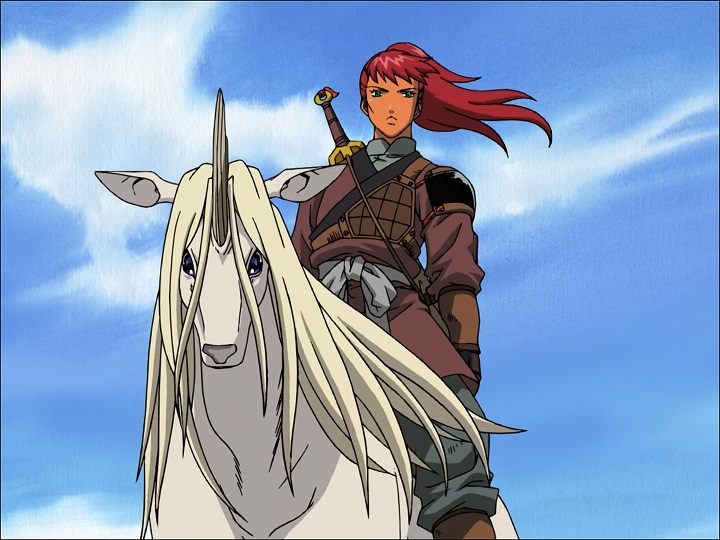
Setting/Story
Next we come to what is simultaneously Twelve Kingdoms‘ greatest strength and weakness, the setting/story. Setting wise, I can’t think of another anime with a world as well realized as this. Twelve Kingdoms goes through incredible effort to establish this world and it shows. Everything from how childbirth differs from our world to the geopolitical situation has been well thought out, along with their relationships to each other. Take how our leads are treated on their appearance to this world: Normally in Isekai, this sort of event is unheard of. But in Twelve Kingdoms its a common enough occurrence that there are local laws about how to deal with them. How to handle the language barrier, their place in society, even the inventions they bring along with them such as Buddhism or printing. Their effect on this world is very well thought out, as is everything else.
The downside to how detailed and thought out this setting is though is the burden it puts on the viewer. Often, especially early on, you are bombarded with what is basically technobabble for a fantasy world. Kaikyaku, Kirin, Taiho, Chousai, Hanjyuu, Hourai, Nyokai, the list goes on. To say you need a dictionary for this series isn’t as facetious as it sounds and this can often get in the way. Imagine being caught up in a scene, a conversation, and suddenly having to remember a specific piece of vocabulary from 10 episodes back. Once you get used to it and come to recognize these terms, it’s not so bad. That Nakajima has to do the same thing, that we share in the leads struggle, is helpful to. But it can definitely make for an awkward moment or take you out of a scene until you come to recognize them.
Story wise, Twelve Kingdoms is in much the same predicament. The narrative truly is fantastic, in no small part due to the characters whom we will get to later, and is definitely worth your time. Every single arc but the last was an incredible experience. The pacing was perfect, slowly building everything up while still telling smaller episodic stories throughout. Many of these arcs start off slowly, and I will admit to not being immediately gripped by them. But every time, without fail, Twelve Kingdoms managed hook me all the way to the end. All it took was one magical moment early in each arc for me to see what it was trying to do. This is because no arc in Twelve Kingdoms is the same, each one approaching a new problem in a new way. Forcing you to look at the world, and its characters from a different angle.
Sadly, while the story is fantastic, it does suffer from one major flaw: It doesn’t end. As I said at the top of this review, Twelve Kingdoms is based on a novel series. One that is still releasing to this day, with each arc effectively being a new novel. In that sense each arc gets an ending, and the series as a whole gets a rather strong finale in episode 39. But that still leaves 6 episodes and 5+ novels to tell. I’m sure you can see the problem. I am not sure if Twelve Kingdoms was canceled unexpectedly or if something went wrong in the planning stage. But the series truly ends in episode 39, at the end of the second novel, with last 6 episodes feeling… well, largely like a waste. The last episode of the entire series is a recap for goodness sake.
That said, even with this disappointing final arc, the rest of the narrative is without a doubt worth your time. Its so strong, and so incredible, that even with 6 wasted episodes I cannot help but recommend it to people.
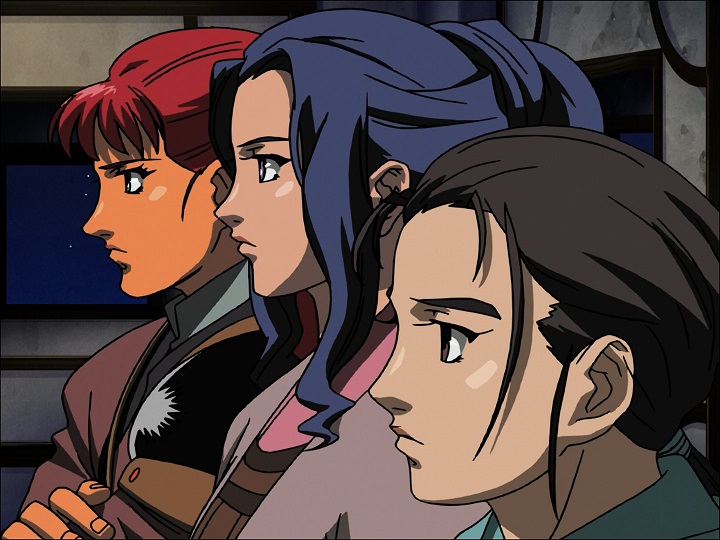
Characters
With the narrative covered we can talk about Twelve Kingdoms‘ incredible characters. And the best way to start this off is with one of the best female protagonists I have ever seen in anime: Nakajima Youko, played by Aya Hisakawa. Like most of Twelve Kingdoms‘ content, Nakajima’s journey is a slow but purposeful one. We see her start as this entitled and naïve girl, one who tries to please everyone without ever being “Nakajima”. But over the course of her incredible journey, through the hellish lows and beautiful highs, we see her transform into a queen. One worthy not only of respect, but fealty. Nakajima’s story gets better after this, as she learns how to rule, how to lead, and how the right answer is not always the most just. And while Nakajima may be the best character in Twelve Kingdoms, she does not stand alone in this incredible cast.
The rest of Twelve Kingdoms cast starts small and grows from there. Alongside Nakajima we are introduced to Sugimoto and Asano, two other students from Japan who are sucked into this world alongside her. During their journey both serve as a window of sorts into Nakajima’s character. Sugimoto attempts to become the “chosen one” of all Isekai stories, despite being nothing of the sort, contrasting Nakajima’s desire to blend in and return home. Meanwhile later on Asano and his inability to integrate into this new world becomes a perpetual reminder of where and just how far Nakajima has come. All the while both get their own arcs of finding their place, discovering who they are and of growth. What makes them even more impressive however is that both are, effectively at least in Sugimoto’s case, anime original characters. They speak to just how well director Tsuneo Kobayashi understood this work.
And yet still, they are not alone, as this makes up but a fraction of Twelve Kingdoms cast. There are many I can’t talk about, such as Shoukei or Suzu, Rakushun or Enki, for fear of spoiling you. But each and every one is given focus, depth, a story beyond what most lead characters get in anime. They don’t simple have an arc and are never heard from again. Rather, their arcs play out in conjunction with everyone else’s over large spans of time. Growth in one character is directly contrasted to another, relationships form and change to reflect who characters become, rather than staying static despite great conflict between them. The best way I can sell it is this: I absolutely hated Shoukei and Suzu when they first appeared and I doubted their arcs. Yet by the end, they became my favorite trio of characters in the whole show.
Simply put, to say that Twelve Kingdoms cast is large, complex and compelling is an understatement. It truly has not just some of the best female characters in anime, but some of the best period. Sure, they are not without fault. I think Keiki could do to be a bit less stiff, or Shouryuu given a bit more flak for his lackadaisical attitude. But at this point that isn’t me criticizing how they are written. Rather, it is me viewing them as people, complex ones with wants and desires of their own. Their arcs aren’t perfect, and the presentation does occasionally let them down here and there. But the writing almost never does and that is worthy of praise in my book. I can only hope that one day we get to see the conclusion of their stories.
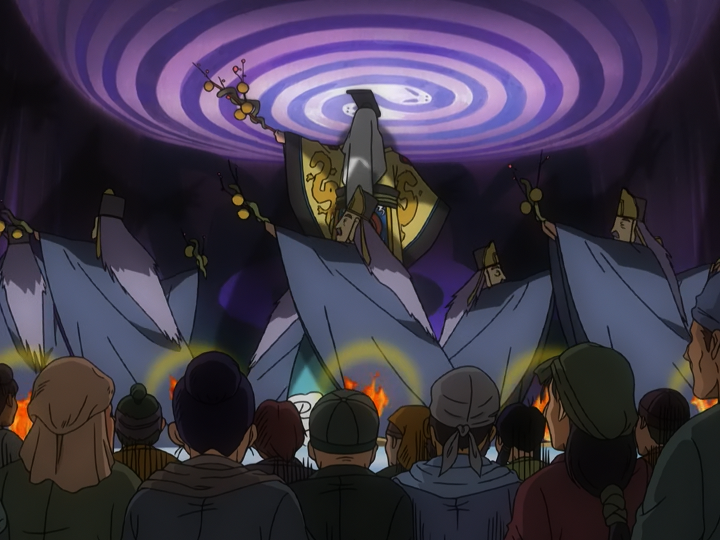
OST/Sound Design
Finally we come to the OST and sound design, always the hardest section to try and judge! On initial viewing, Twelve Kingdoms OST sounds surprisingly simple. It makes for good background and travel music, and I especially like the Chinese influence which also permeates the rest of the setting. But it was only after listening to the OST in full did I discover something great: Twelve Kingdoms OST is not a large number of small, simple tracks. Rather it is a small amount of complex tracks that cover a wide range, with different parts of each track being used in different scenes. Many times I found songs that I originally thought were separate pieces but in actually were different parts of the same song. If this sounds bad, how can songs sound so drastically different and still work, I understand, I was surprised to. But here are a few examples.
Take for instance “Kuni-Touhoureiin“, which starts primarily as a strings piece before shifting into flutes, then a rolling drum and finally back to strings. I initially thought when watching that each of these came from a different track. Yet when combined, when allowed to listen to the transitions between them, they work beautifully. You can see this as well in “Ifuuoukei” where it starts with a low flute before transitioning into more combative strings and drums. Really selling the shift from everyday doldrums to war and violence. Not to mention pieces such as “Getsumeifuuei” that have multiple versions. One with a slow and contemplative vocals and another with faster paced and more active singing. Its the same song, but the pace and way each are played make them feel unique, especially when you hear how they are used in the show itself. All in all, Twelve Kingdoms OST is fantastic.
Meanwhile the actual sound design is pretty good as well. I can’t think of any moments where I was taken out of a scene by the sounds. That said, nothing really stood out to me either. The OST does a lot of the heavy lifting when it comes to setting a scene while actual environmental sounds are usually pretty basic. You may get a steady background of crickets at night, or wind perhaps, but nothing particularly unique or reactive to the scene. Basically, Twelve Kingdoms sound design is… acceptable. It won’t blow your mind, its not going to inspire the same way Hajime no Ippo’s jet engine punches and screeching tire footwork does. But it also won’t ruin your immersion. And for as much as the rest of the show does, that’s good enough.
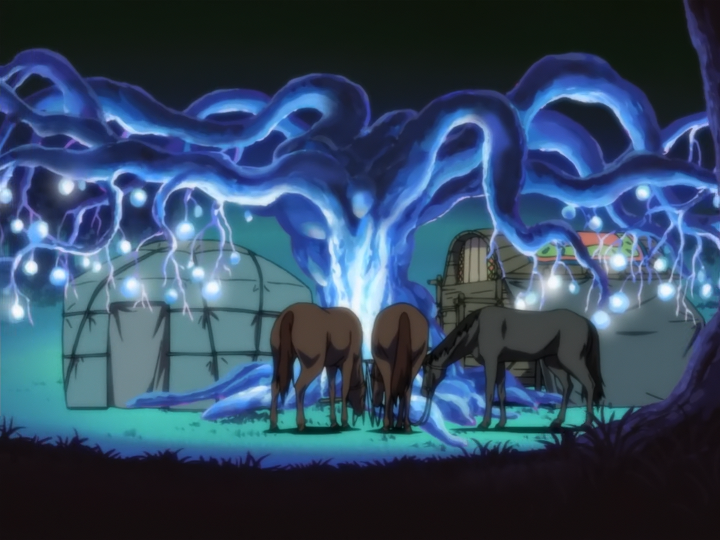
What Isekai have lost: Old vs New
Now we come to the personal part of the review, where I wax poetic about some tangentially related topic. This doesn’t effect the final score at all. It only exists to let you readers into my head and to try and explain where my head is at, without the burden of reviewing anything. If that doesn’t work for you, or you don’t care, then go ahead and skip to the conclusion. For those that are curious, lets talk how Isekai have changed!
Despite what some newer anime viewers may think, Sword Art Online did not invent the Isekai genre. It wasn’t even the first video game Isekai, with the .Hack// series and Digimon predating it, just to name two. What SAO did do though was bring it back to modern viewers and with that basically rewrite what the genre was about. Suddenly Isekai was a power fantasy, and I didn’t like it. Now the focus was about who was stronger, about harems and wish fulfillment. Characters came to these new worlds with escapist fantasies about being important despite never actually doing anything in the real world. This is the exact kind of character, of world view, that Twelve Kingdoms criticizes through characters like Sugimoto. Suddenly, Isekai was no longer about criticizing our world and our lives through a fantasy lens, but about escaping it.
Compare this to my first Isekai, .Hack//Sign, and its lead Tsukasa. Tsukasa didn’t have a harem nor was he really a hero. More than anything Tsukasa is a victim and the story itself is centered around personal growth rather than any world-ending events. The videogame of .Hack//Sign isn’t used as a substitute for reality, but rather an extension of it. Actions in the game have consequences in reality, characters have lives and relationships outside the game and it explores how these anonymous people you meet online are living, breathing, complex people. Twelve Kingdoms does something very similar. When Nakajima comes to this world, her problems from Japan don’t disappear. Rather they come with her and this new world only reveals and brings them to the forefront. It forces her to confront who she was and grow, rather than run away from her problems like many Isekai do now.
Basically my issue with Isekai today is that they are no longer about growth. Yes, occasionally one comes along that remembers this. But by and large the genre is dominated by escaping reality rather than reflecting it. The characters travel to other worlds to get away from their problems, to avoid growing as people. Similarly the worlds themselves are all the same brand of Tolkien fantasy. Gone are the complex settings such the twelve kingdoms and the Void Sea, or the fully realized bath house of Spirited Away. Maybe I am asking to much with this. Maybe the genre has forever changed, and the time of epic fantasy and real world analogues has past. But if so I can at least remember that time with series such as Twelve Kingdoms.
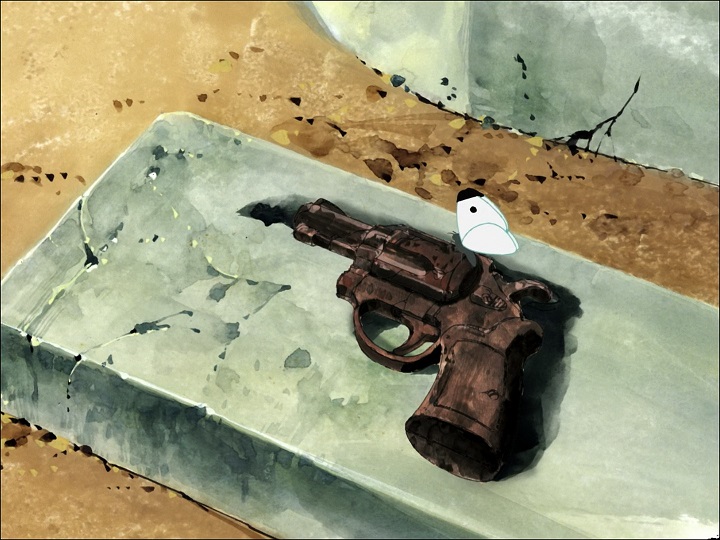
Conclusion
So with all that, when everything is said and done at the end of the day, how was Twelve Kingdoms? As a journey, it was incredible. Every arc but the last did a great job of bringing these characters to life. Of showing me what it was like to adapt to and live in this world. The characters are also some of the best I have seen in a long time, with Nakajima handily earning her place as one of the best female protagonists in anime. The worst thing I have to say about it is that the true ending comes 6 episodes before the finale. Episodes 40-45 are easily the weakest in the anime and Twelve Kingdoms could be said to end on episode 39. And yet even despite this, I can’t help but want more. So is Twelve Kingdoms good? Yes. Should you watch it? Absolutely.
And that is a wrap for another season of Throwback Thursday! I want to thank everyone for tagging along, as this was a longer journey than our last. With that said though, it is time to announce our next show and it is… the first season of Spice and Wolf! Made by Studio Imagin in 2008 and produced by Takeo Takahashi, this story of travel and mercantile has been on my list for a long time! This is only a 13 episode series so we will be covering 1 episode a week, starting next week. The first post should be up on January 21st. I hope you all will join me as we meet the legendary wolf waifu of the 2000’s! Like always, if you have a series you want covered, please leave a comment and it can go on the list for voting next time.
And if you want to leave a comment you can do so here or find me over on twitter! See you next week.

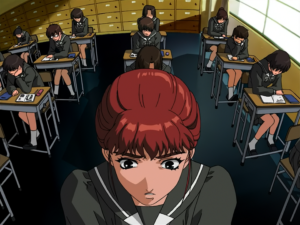
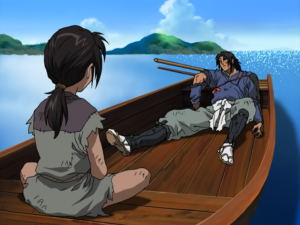
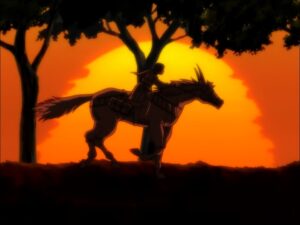
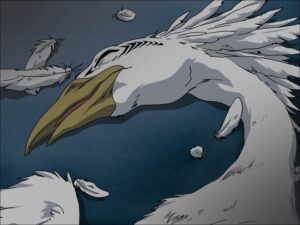
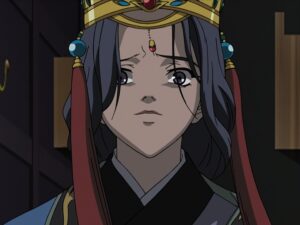
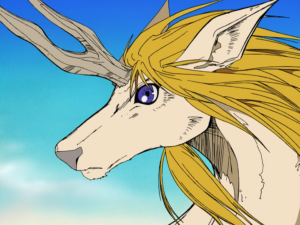
Your rating is just one point below Psgels. Did you notice?
Definitely agree on your point about isekais losing what once made them great. I actually did watch a couple episodes of .Hack//Sign several years ago, but I dropped it because I always felt lost while watching it. It felt to me like I was missing important context for it, or that I needed to play the video game that inspired it in order to appreciate it. I ought to get back to it, because I have heard a lot of great things about it, and I want to like it. What are your thoughts on it, if I may ask?
Haha, I actually hadn’t! Great minds think alike then. At the end of the day, for all that I loved the journey, the 6 episode ending was really lackluster for me and knocked it down just a bit.
For .Hack//Sign, I really need to rewatch it. I have very fond memories of it and I do think Tsukasa, the lead, has a really great arc about being a victim and home abuse, etc. I also quite like the relationship with Subaru. But the wider overarching plot is something I really dont remember all that well because it was so long ago.
Oh, but its the best soundtrack Yuki Kajiura ever made. So there is that.
Reccomended Link for all Twelve Kingdom fans :
-http://www.eugenewoodbury.com/
-http://eugenewoodbury.blogspot.com/2009/04/the-twelve-kingdoms-novels.html
about Modern Isekai, I worryingly think this is effect of demographic and culture. Its occur simultaneously with post-apocalyptic fiction in America and Overpowered character in Chinese Xianxia. It might be effect of increasingly unmoored young man in modern society.
Interesting, ill have to look into that timeline. I never drew a connection between post-apoc fiction in the west, but I wouldn’t be surprised. Both have slowly become the home of increasingly nationalistic and “apolitical” speech that has otherwise been shunned.
I AM WORKING TO MAKE 50 THE NEW “AVERAGE”What you mean to do is adjust ratings so that, if you were to rate all anime ever made, the average (mean) rating would be 50/100. But that does not mean 50% of the shows would be above mean, because there is no way anime scores have normal distribution – for that there would have to be the same number of 4/10 shows as there is 6/10, but that is stupid, as few 0/10 shows (but more than 10/10 shows) may offset a really lots of 6-7/10.
Even if you forcefully normalized the distribution to normal distribution, that would still be pointless, as the average quality of the shows changes every time a show is made. I hope you now see how stupid an average 50/100 is.
But I’m pretty sure you want to give the show ‘with the average quality’ score 50/100, but there is no such thing as average quality! And to that I can only say. I dont mean to be mean, but, I mean, the mean doesnt mean what you mean the mean to mean. See for yourself:
1 Mean means average, sum/count. I.e., how good all anime in general are. This can be high, even if the most anime is shit, or the opposite. You pick random anime ENOUGH TIMES and you will expect the pick to be of exactly average quality. This may sound good on paper, but once new non 50/100 show comes out, mean changes to something you dont want.
2 Median means the value in the middle of a sorted set of values. I.e., you watch anime in order of how good they are and once you have watched half of them you are at the median quality. not very useful for anime watcher/rater. You may thing at this point it should be exactly 50/100, but that is stupid, as once a new non 50/100 show comes out, median may change to something you dont want.
3 Mode means the most frequent/likely value. I.e. you pick ONE random anime and the probability that it will have the mode quality is the highest. Once new non 50/100 anime comes out, mode may change to something you dont want.
You cant readjust the scores every time a show comes out! It would render rating meaningless!
The takeaway from this is, that if you want to rate such as the mean or median or mode is 50/100, you would first need to rate all anime (which I know from personal experience to be impossible)! You desire normalization and that is post-processing you dont do with raw values! So stop ‘adjusting’ your rating to seem unbiased, because in effect you will make it meaningless. The point is that you can compare different shows, but once you start normalizing, you can never do that, because new ratings will be influenced by normalized ones and corrupt the result into meaningless endeavor!
I dont know how to respond to this other than “50” to me means “average”. If I dont put it there, 50 becomes assumed to be a bad score. If I put it there, then you know what I mean when I say “average” and dont judge it on the modern rating scale where anything sub-70 is bad.
Honestly I think you are over reading into what was basically a “50 isnt a bad score, shut up about it please” line.
89/100 for Twelve Kingdom (anime) is massively overrated. Half of the show is filler quality and the most poignant part (where the three main women confess sins, conquer fears and co-join forces) has simplistic circumstances, idealistic conclusion and seems anticlimactic and rather stubbornly concentrated on ‘girl power’, to the detriment of many characters. The messages in the series also do not seem to evolve and seem repetitive and childishly simple – as if good heart is all it takes for good king, as if hardship cures weakness – a fairytail indeed.
Twelve Kingdoms is an epic indeed, but that on its own doesnt warrant higher scores. The Legend of the Galactic Heroes deserves 9/10, Twelve Kingdoma maybe 1.5-2 less than that – a comfortable 7.
“Basically my issue with Isekai today is that they are no longer about growth. The characters travel to other worlds to get away from their problems, to avoid growing as people”
What the show is about has nothing to do with how good it is. Just because Konosuba is a small-scale comedy and not a grand epic, doesnt make it worse (I argue it is better in overall).
What changed is not an isekai genre, but the medium itself. It became pure entertainment, for which it got rid of everything: it’s messages, worlds, characters, growth, so on… – it all gets in the way when money/episode is concerned. If good 12 ep show can be enjoyable, 10 copy-pasted shows of that show is better than one good 120ep one, because it is more accessible. More accessible = more people = more joy overall. It’s a good thing. Do I not sound like a marketing guy? The soul has been sucked out of the medium and it will only get worse, the exceptions and marketing hypes prove nothing.
Moe standardized certain techniques and simplified/allowed copy-paste and commercialization of vapid trash. ‘AAA production values’ produced quality race where people are fooled that soulless + pretty + flashing = interesting. Westernization is stupid as it brought in politization of the medium. Etc.
I know people do not want to hear this, but it is true. And the main offenders are none other than the likes of Shaft, Ufotable or KyoAni and their ‘artistic’ vomit full of nuance and ‘attention to detail’. But I’m sure I’m preaching to the wrong crowd, I mean Kimi no Na wa is 9/10 on MAL. And now Khara doesnt know when to stop (is there any hope 4th movie is gonna be any good?) and it even openly criminalized Evangelion doujinji – you know the end is here.
I keep reading the 1st ep impressions on this blog and year after year it gets more boring. Not even sequels to established franchises are any good anymore. Fortunately once in a while something interesting comes up. But even the rare gems are not what they used to be just 2-3 years ago. I dont know… Did anyone see Quan Zhi Gao Shou? That was VERY interesting one indeed! When Chinese SAO is actually really really good, you know the era of turmoil is among us.
It’s gonna be interesting to see more gaijin animation studios pop up around the world in the next 10 years! I’m sad Japan is about to lose anime as (only) its thing and I’m even more sad that I think it’s gonna be a good thing. Trust me, there is nothing to lose at this point. And after seing Quan Zhi Gao Shou, I say China is ready to go full weeb and I’m ready – because it’s gonna be FRESH! And that will keep the medium alive for a while.
PS: Watch Quan Zhi Gao Shou
“Do I not sound like a marketing guy?”
Nah, more like a nostalgia-blind old coot who forgot he was commenting on a Twelve Kingoms review a third of the way through his response.
🙂
“What the show is about has nothing to do with how good it is.”
It does to me. The subject matter of the show matters a lot, actually. You are correct that they don’t need to be grand epics, .Hack//Sign isn’t a grand epic. But I do need them to be personal stories about the characters in them. Otherwise you end up with static crap like Konosuba. I dont like Konosuba because its a bunch of shitty jokes and nothing else. There is no substance to the show and so I dont like it. I could just watch standup comedy for a better experience. I don’t have enough time on my hands to bother sitting around watching stuff like that. Occasionally popcorn entertainment is good, it has its place. But my personal brand of popcorn is action such as Akudama Drive, not comedy and especially not comedy like Konosuba.
“What changed is not an isekai genre, but the medium itself. It became pure entertainment, for which it got rid of everything: it’s messages, worlds, characters, growth, so on… ”
I dont think this is true at all, because you still have original or adaptations such as Ping Pong the Animation, Showa Genroku Rakugo Shinju, Run With the Wind, Chihayafuru, Haikyu etc still being made. All of these series have messages, worlds, growth, and so on. They are not pure entertainment and I think to say that the entire medium has abandoned these things for raw entertainment is just flat out wrong.
“Quan Zhi Gao Shou”
I did watch Kings Avatar. It was mediocre.
Listen “evafan” first of all, Twelve Kingdoms wipes the floor with Neon Genesis Evangelion. All NGE knows how to do is complain about the same mommy and daddy issues for 26 episodes only to conclude it with, “just love yourself”. If you wanna talk about simplistic, childish, repetitive, and fairytale-like, those terms would apply much more easily to Eva.
Secondly, now to your points:
“89/100 for Twelve Kingdom (anime) is massively overrated. Half of the show is filler quality”
Half the show focuses on non-main characters if you treat Youko as the main character, yes. Does that mean that those parts are “filler quality”? No, because the Taiki arc devotes an incredible amount of time and detail to Taiki’s development, and the King of En arc at the end raises relevant, thought provoking issues concerning the two-sided nature of being a king in the world that the series establishes. These arcs may not be as good as the ones centering around Youko but I don’t see how these arcs are a detriment to the show’s quality.
“and the most poignant part (where the three main women confess sins, conquer fears and co-join forces) has simplistic circumstances”,
Shoukei was in her father’s court while her father committed atrocities. She was not directly responsible, and yet she faces the ire of the people for what her father did, and goes from living in luxury to living in poverty. How is this simplistic, when the situation raises questions about privilege and moral/social responsibility? Was she partly to blame, or was she innocent? Should she have done something, or was she not obligated to do anything?
Suzu was sold by her family at a young age and then transported to a foreign world in which she didn’t know the language and was mistreated for 100 years, so she has good reasons to pity herself, and at the same time her self pity is used to absolve herself of responsibility for improving her own situation. A lot of people in real life get stuck in bad circumstances and then just sit there and cry about it. The lesson is that yes, she had it bad, but so do other people, and furthermore, you have to help yourself.
Both girls have understandably sympathetic circumstances and it’s easy to see how people in those situations would feel the way they do, but they still have to take responsibility. That’s a story with two sides to it, so how is it simplistic?
Youko being thrown in a political court with status and no power is a complicated political entanglement. Even in our own world of politics, both politicians and people get swayed by rhetoric just like Youko because they’re not on the ground actually observing the situations that the government is making policies about.
“idealistic conclusion”
What makes it idealistic? That Youko was able to find the root of the corruption? Are you forgetting the hardships that all three girls had to suffer to earn that conclusion, and the people that died? And how the villagers still wouldn’t help the people that were trying to fight for them?
” and seems anticlimactic”
How so?
“and rather stubbornly concentrated on ‘girl power’, to the detriment of many characters.”
The series happens to have three female main characters that take charge of their lives. What’s wrong with that? It’s not like there’s a scene where the girls have undue influence over the plot; Shoukei and Suzu help in the small ways they can using their previously established abilities and knowledge. Moreover, the most successful king in the world of 12K is a male. The leaders of the rebellion were all male. How is it a detriment to many characters?
“The messages in the series also do not seem to evolve and seem repetitive and childishly simple – as if good heart is all it takes for good king, as if hardship cures weakness – a fairytail indeed.”
The whole point of the first few episodes of the third arc was that though Youko meant well, she didn’t have the political clout and knowledge to effectively rule her kingdom. Hardship playing a major part in making characters realize their mistakes is not only true, but the exact opposite of the type of thing that occurs in sugarcoated/idealistic fairy tales. Furthermore, Suzu and Shoukei have experienced years of hardship without learning anything; it was only when they saw more of the world and met people to expand their perspective that they were able to reflect thoughtfully on hardship.
Finally, I did watch King’s Avatar. I enjoyed it, but the storytelling in this is as basic as it gets. The viewer enjoys watching this overpowered RPG god show up noobs for 12 episodes. I agree that anime has been declining in quality for the past ten years but if you’re going to talk about recent gems then there are much better examples, like Nami yo Kiitekure.
Twelve Kingdoms is one of my favorite past days fantasy anime. Wishing one day there would be a remake or at least an English publisher would continue with novel releases.
I would love it if they picked up the novels or continued the adaptation again. I actually went out and ordered some of the novels after finishing this series, so I am looking forward to reading more. Maybe I can do a fun article on that… Thoughts for the future.